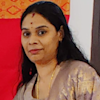Gayathri Veera gives some insights into Diwali celebrations
At IDP, we love celebrating our people's cultures and festivities! Diwali/Deepawali is one of the biggest celebrations on the Hindu calendar, Gayathri Veera, Project Manager – PX, Chennai, India, shares her experience with us.
Gayathri Veera gives some insights into Diwali celebrations

Gayathri Veera
28 October 2025Diwali, or Deepawali, is one of the biggest Hindu celebrations. It celebrates the plight of good over evil. Gayathri (Guy-three) Veera (she/her) explains a bit more about the festivities from her perspective.
“Diwali (North Indian pronunciation), or Deepawali (South Indian pronunciation), is one of the biggest celebrations in the Hindu calendar. The timing is based on the position of the stars and falls on a new-moon day of the Karthik month (October or November). Different parts of India celebrate different things, but it is all about good over evil, light over darkness. Diwali means “a row of lights”.
The origins of Diwali vary in different parts of India. There are different versions of the story that people believe. Where I am from, the most popular belief is the return of Lord Rama to his birthplace, Ayodhya, with his wife Sita and brother, Lakshman.
We celebrate Diwali with lots of lights and fireworks. October and November are the wet months, and with it being harvest season, traditionally the burning of lamps ensured the insects were kept away from the crops. Our lamps are still made of clay. Oil and wick are used for the light. These lamps are placed in every part of our house and our streets glow bringing in festivity.
My family celebrates over 5 days:
On the first day, we clean the house.
On the second day, we prepare sweets (For eg: adhirasam, gulab jamun, boli, ladoos) and savouries (For eg: murukku and pakodas).
On the third day we pray for wealth - Lakshmi pooja.
On the fourth day, we light lamps and fireworks. Some people have nombu on this day, where they pray for the wellbeing of their kith and kin. Women fast in the morning and have one meal at night.
On the fifth day, we wear Diwali clothes, visiting friends and relatives, sharing sweets and bursting firecrackers with them. On this day, brothers visit their sisters and exchange gifts specifically.
In India, people of different faiths also join in the celebrations with the lights and fireworks.
What I love about Diwali is the visits from friends and family, and the togetherness. Forgetting all differences we celebrate the festival wholeheartedly as one big family, indulging in all the delicacies and reliving our childhood, and bursting crackers.
My kids love the firecrackers – there are about 100 varieties. It’s exciting to see what the latest crackers are and who has the most. Elders give money to the kids to signify more wealth. Women receive new sarees and gold, signifying prosperity and abundance from their parents.”
Thank you, Gayathri, for explaining more about this important festival. We hope you, your family, and everyone in our network had a very happy Diwali!
We look forward to sharing more about our people’s cultures and festivities! Here’s Maher's story about Ramadan we shared recently.